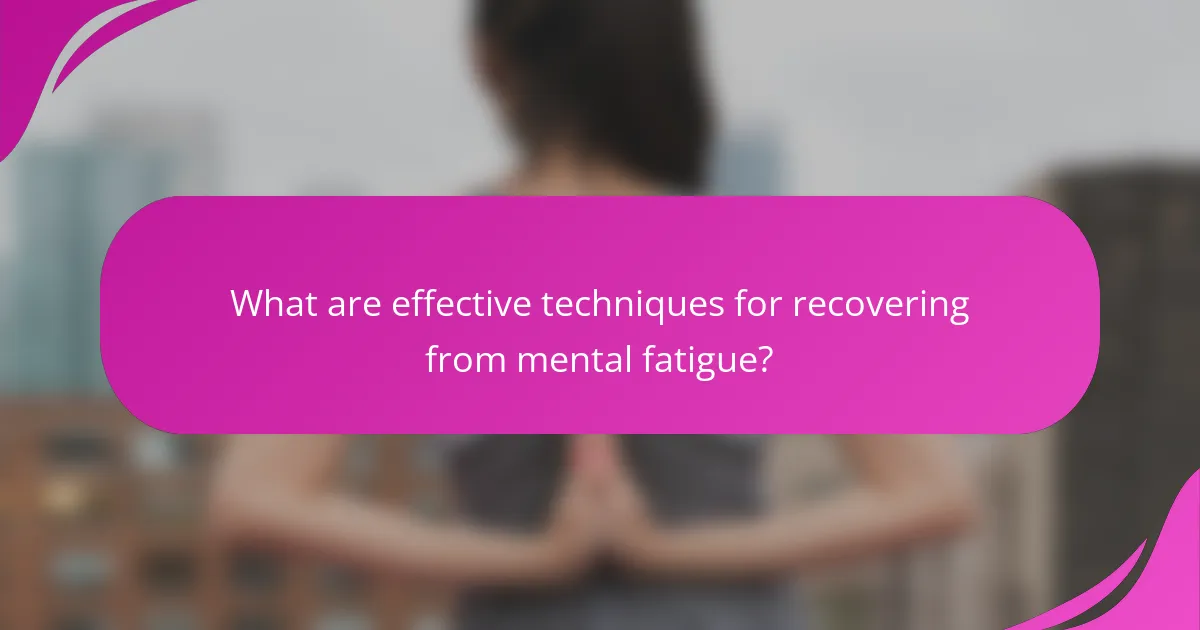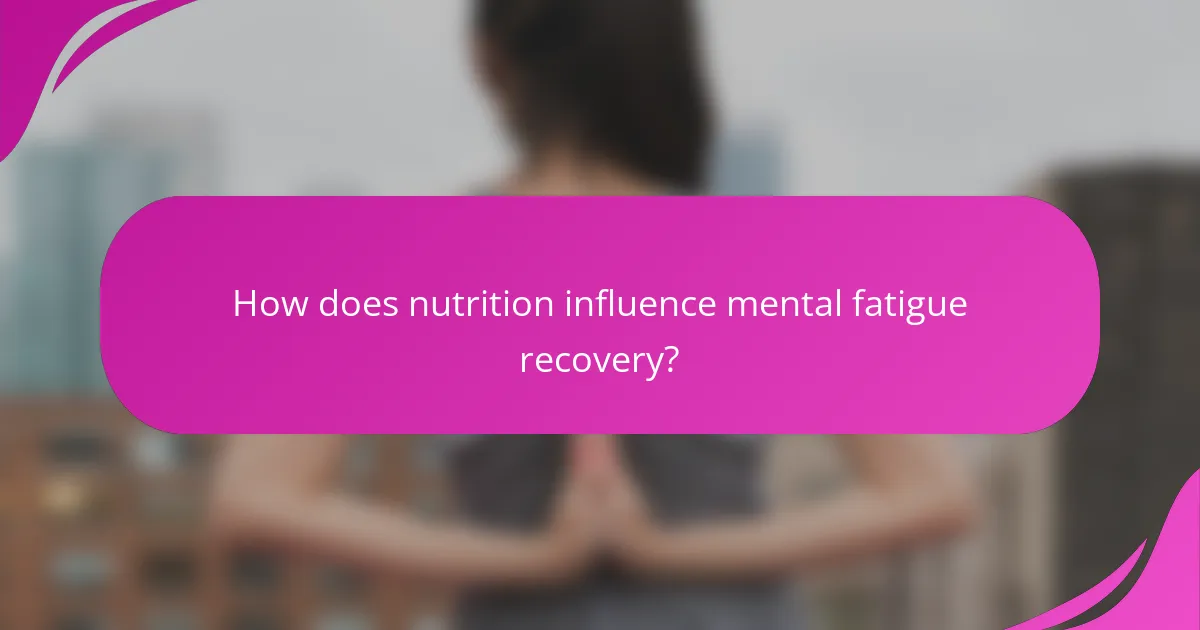Recovering from mental fatigue is essential for athletes aiming for peak performance. This article explores effective techniques for recovery, including structured rest, proper nutrition, and mindfulness practices. It highlights the importance of a balanced diet and hydration in enhancing cognitive function. Additionally, it discusses the role of mindfulness in reducing stress and improving focus for optimal athletic outcomes.

What are effective techniques for recovering from mental fatigue?
Effective techniques for recovering from mental fatigue include structured rest, proper nutrition, and mindfulness practices. Prioritising sleep enhances cognitive function and reduces fatigue. Balanced meals with complex carbohydrates, proteins, and healthy fats provide sustained energy. Mindfulness techniques, like meditation and deep breathing, promote mental clarity and resilience. Regular breaks during intense mental tasks prevent burnout and improve focus. Engaging in physical activity also boosts mood and cognitive performance.
How does sleep quality impact mental recovery for athletes?
Sleep quality significantly enhances mental recovery for athletes by improving cognitive function and emotional resilience. Adequate sleep fosters better decision-making and reduces stress, which are crucial for peak performance. Research indicates that athletes who prioritise sleep experience lower levels of mental fatigue and improved focus during training and competition. The recommended sleep duration for optimal recovery is between 7 to 9 hours per night. Additionally, sleep quality influences the release of hormones such as cortisol and serotonin, which play a vital role in mood regulation and stress management. Prioritising sleep as part of a comprehensive recovery strategy can lead to enhanced athletic performance.
What role does structured rest play in mental fatigue recovery?
Structured rest is crucial for recovering from mental fatigue, as it enhances cognitive performance and resilience. Implementing breaks that are intentional and scheduled allows the brain to rejuvenate and process information effectively. Research indicates that structured rest periods can improve focus and decision-making skills, vital for peak athletic performance. This approach not only mitigates fatigue but also fosters long-term mental health benefits, ensuring athletes maintain optimal performance levels.
What are the best practices for incorporating rest days?
Incorporating rest days is crucial for mental fatigue recovery and peak athletic performance. Schedule rest days strategically, ideally after intense training sessions. Prioritise active recovery activities like light stretching or yoga to maintain movement without strain. Nutrition plays a vital role; consume balanced meals rich in protein and carbohydrates to support recovery. Mindfulness practices, such as meditation, can enhance mental clarity and reduce stress during rest periods.
How can active recovery sessions aid mental rejuvenation?
Active recovery sessions enhance mental rejuvenation by promoting relaxation and reducing stress. Engaging in low-intensity activities, such as walking or yoga, stimulates blood flow and encourages the release of endorphins. This biochemical response can alleviate feelings of fatigue and improve mood. Additionally, these sessions provide mental breaks, allowing athletes to reset their focus and enhance cognitive clarity. Incorporating mindfulness techniques during active recovery can further deepen the mental benefits, fostering a state of calm and improved mental resilience.
Which mental training techniques can enhance recovery?
Mental training techniques that enhance recovery include visualization, positive self-talk, and mindfulness meditation. These methods help athletes manage stress, improve focus, and foster a positive mindset, ultimately leading to better recovery outcomes. Visualization allows athletes to mentally rehearse recovery scenarios, while positive self-talk boosts confidence and resilience. Mindfulness meditation reduces anxiety and enhances emotional regulation, contributing to overall mental well-being. Incorporating these techniques into a recovery regimen can significantly improve athletic performance and mental fatigue recovery.
How does visualization contribute to mental recovery?
Visualization significantly aids mental recovery by enhancing focus and reducing stress. This technique allows athletes to mentally rehearse their performance, leading to improved confidence and clarity. Research indicates that visualization can lower anxiety levels, facilitate relaxation, and promote a positive mindset, all crucial for effective recovery. By creating vivid mental images of successful outcomes, athletes can reinforce their skills and maintain motivation during challenging recovery periods.
What are the benefits of cognitive-behavioral strategies?
Cognitive-behavioral strategies enhance mental fatigue recovery by improving focus, resilience, and emotional regulation. These strategies help athletes manage stress and maintain peak performance. They promote positive thinking patterns, reduce anxiety, and foster adaptive coping mechanisms. As a result, athletes can recover more effectively and sustain their mental energy during intense training and competition.

How does nutrition influence mental fatigue recovery?
Nutrition significantly aids mental fatigue recovery by providing essential nutrients that support brain function. A balanced diet rich in omega-3 fatty acids, antioxidants, and vitamins can enhance cognitive performance and reduce fatigue. For example, foods like fatty fish, berries, and leafy greens are known to improve mental clarity and resilience. Hydration also plays a crucial role; even mild dehydration can impair cognitive abilities. Therefore, incorporating nutrient-dense foods and maintaining proper hydration can optimize recovery from mental fatigue.
What are the key nutrients essential for brain health?
Key nutrients essential for brain health include omega-3 fatty acids, antioxidants, B vitamins, vitamin E, and magnesium. Omega-3 fatty acids support cognitive function and reduce inflammation. Antioxidants combat oxidative stress, protecting brain cells. B vitamins, particularly B6, B12, and folate, play crucial roles in neurotransmitter synthesis. Vitamin E may help prevent cognitive decline, while magnesium is vital for neural function and mood regulation. Prioritising these nutrients can enhance mental performance and recovery.
How does hydration affect mental performance?
Hydration significantly enhances mental performance by improving focus, cognitive function, and mood. Dehydration can lead to fatigue, decreased attention, and impaired decision-making. Studies show that even mild dehydration can negatively impact cognitive abilities, emphasizing the importance of adequate fluid intake for athletes. Maintaining hydration levels supports optimal brain function, crucial for peak athletic performance.
What foods should athletes prioritize for optimal mental recovery?
Athletes should prioritize foods rich in omega-3 fatty acids, antioxidants, and complex carbohydrates for optimal mental recovery. These nutrients support brain function and reduce inflammation.
Foods such as fatty fish, berries, leafy greens, and whole grains are particularly beneficial. Omega-3s from salmon improve cognitive function, while antioxidants in berries combat oxidative stress. Whole grains provide sustained energy, essential for mental focus during recovery periods.
Incorporating these foods into a balanced diet enhances mental resilience, aiding athletes in recovering from fatigue effectively.
How can meal timing impact mental fatigue?
Meal timing significantly impacts mental fatigue by optimizing energy levels and cognitive function. Consuming meals at strategic intervals can enhance focus and reduce fatigue during athletic performance. Research indicates that balanced meals consumed before and after exercise improve mental clarity and endurance. For instance, timing carbohydrate intake around workouts can replenish glycogen stores, leading to better cognitive performance. Additionally, maintaining hydration and incorporating protein can further support mental acuity. Adjusting meal schedules to align with training sessions can maximize recovery and mental resilience.

What unique mindfulness practices support mental recovery?
Mindfulness practices that support mental recovery include deep breathing, body scanning, and mindful movement. These techniques enhance focus and reduce stress, promoting faster recovery from mental fatigue. Deep breathing exercises lower cortisol levels, while body scanning increases body awareness. Mindful movement, such as yoga, integrates physical activity with mindfulness, improving overall mental resilience. Regular practice of these techniques can lead to sustained peak athletic performance.
How does mindfulness meditation specifically aid athletes?
Mindfulness meditation aids athletes by enhancing focus, reducing stress, and improving recovery. It fosters mental clarity, enabling athletes to maintain peak performance under pressure. Studies show mindfulness can decrease anxiety levels by 30%, promoting a calm state conducive to optimal performance. Additionally, athletes report improved sleep quality, which is crucial for recovery and overall health.
What are the steps to implement mindfulness in training?
To implement mindfulness in training, follow these steps:
1. Set clear intentions for each training session to focus on specific goals.
2. Incorporate breathing exercises to enhance awareness and reduce stress.
3. Practice body scans to connect with physical sensations and improve focus.
4. Use guided mindfulness meditation to cultivate mental clarity before workouts.
5. Reflect on training experiences to reinforce lessons learned and emotional responses.
What role does breathing technique play in mental recovery?
Breathing techniques significantly enhance mental recovery by promoting relaxation and reducing stress. These methods activate the parasympathetic nervous system, which counters the fight-or-flight response. Controlled breathing increases oxygen flow to the brain, improving cognitive function and emotional regulation. Techniques such as diaphragmatic breathing and box breathing have been shown to lower anxiety levels and enhance focus, making them valuable tools for athletes in recovery. Implementing these strategies can lead to improved mental clarity and resilience, crucial for peak performance.

What rare strategies can enhance mental fatigue recovery?
Incorporating rare strategies can significantly enhance mental fatigue recovery. Techniques such as neurofeedback training, which uses real-time brain activity monitoring, can optimize mental performance. Additionally, incorporating adaptogenic herbs like Rhodiola rosea may improve resilience to stress and fatigue. Mindfulness practices, specifically nature immersion, have shown to reduce cognitive fatigue effectively. Lastly, engaging in creative activities, such as painting or music, can stimulate mental recovery by promoting relaxation and cognitive flexibility.
How can technology be utilized for mental recovery?
Technology can enhance mental recovery through apps, wearables, and online resources. These tools provide personalized strategies, track progress, and offer guided mindfulness exercises.
Mobile applications like Headspace and Calm deliver structured mindfulness training, improving focus and reducing stress. Wearable devices can monitor physiological signals, offering insights into recovery patterns. Virtual reality environments can simulate calming settings, aiding in relaxation.
Integrating these technologies into daily routines can optimize mental performance. For example, utilizing a meditation app for just ten minutes daily can significantly reduce mental fatigue.
Overall, leveraging technology fosters a proactive approach to mental health, enabling athletes to maintain peak performance.
What apps are recommended for tracking mental fatigue?
Several apps are recommended for tracking mental fatigue, including Headspace, Calm, MyFitnessPal, and Sleep Cycle. These applications help monitor mental health, promote mindfulness, and optimize nutrition. Headspace focuses on meditation, while Calm offers relaxation techniques. MyFitnessPal tracks nutrition for better energy management, and Sleep Cycle analyzes sleep patterns to improve recovery. Each app provides unique features that support mental fatigue recovery strategies.
What unconventional methods have proven effective?
Unconventional methods such as breathwork, sensory deprivation, and nature immersion have proven effective for mental fatigue recovery. Breathwork enhances oxygen flow, improving cognitive function. Sensory deprivation reduces distractions, allowing for deep mental rest. Nature immersion boosts mood and reduces stress, supporting overall mental clarity.

What are the best practices for optimizing mental recovery?
To optimize mental recovery, focus on structured strategies that enhance cognitive function and emotional well-being. Prioritise techniques such as regular mental breaks, effective time management, and engaging in restorative activities.
Nutrition plays a crucial role; consume a balanced diet rich in omega-3 fatty acids, antioxidants, and hydration to support brain health. Mindfulness practices, including meditation and deep breathing exercises, can significantly reduce stress and improve focus.
Incorporating these practices consistently fosters peak athletic performance and aids in mental fatigue recovery.
What common mistakes should athletes avoid in recovery?
Athletes should avoid neglecting sleep, skipping hydration, and ignoring nutrition during recovery. These mistakes can hinder mental and physical recovery, impacting overall performance. Prioritising adequate rest, maintaining fluid intake, and consuming balanced meals are essential strategies for optimal recovery. Additionally, overlooking mindfulness practices can lead to increased mental fatigue, detracting from peak athletic performance.
How can athletes create a personalized recovery plan?
Athletes can create a personalized recovery plan by incorporating mental fatigue recovery strategies tailored to their needs. Key techniques include structured rest periods, nutrition focused on hydration and nutrient timing, and mindfulness practices such as meditation.
Integrating specific recovery techniques like deep breathing exercises can enhance mental clarity. Nutrition should prioritise carbohydrates and proteins post-exercise to replenish energy levels and support muscle repair. Mindfulness practices, such as visualization, can help athletes maintain focus and reduce stress during recovery.
Regularly assessing the effectiveness of the recovery plan ensures it meets the athlete’s evolving needs. Adjustments may involve altering nutrition intake based on training intensity or incorporating new mindfulness techniques to enhance mental resilience.
What factors should be considered in a tailored approach?
A tailored approach to mental fatigue recovery should consider individual athlete needs, recovery techniques, nutrition, and mindfulness practices. These factors enhance performance by addressing unique fatigue triggers.
Key factors include:
1. **Personalization**: Assess individual fatigue levels and triggers.
2. **Recovery Techniques**: Implement strategies like active recovery and rest.
3. **Nutrition**: Focus on hydration, balanced macronutrients, and recovery supplements.
4. **Mindfulness Practices**: Incorporate meditation and breathing exercises to reduce stress.
This comprehensive strategy ensures optimal recovery and peak performance.